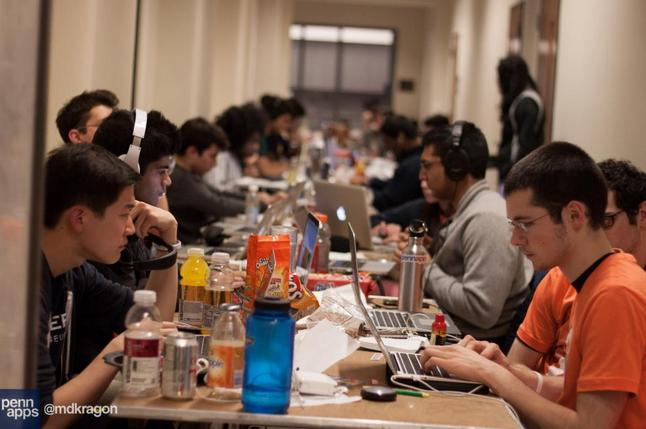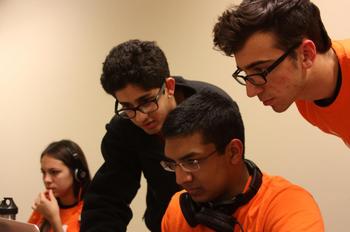University of Michigan to host more than 400 students for major 'hackathon'

Michigan Hackers compete at the PennApps Hackathon in Philadelphia earlier in January. Michigan hackers placed a number of teams in the Top 20 including the top audio hack at the competition.
Photo courtesy Jack Wink
The MHacks Hackathon, presented by student groups Michigan Hackers and MPowered, will attract 500 students from across the country to Palmer Commons where they will “hack” for 32 straight hours on Feb. 1-3.
The marathon coding sessions, which have been gaining popularity in the technology world since the mid-2000s, aim to put pressure on developers that can produce new and exciting innovations.
Get Ann Arbor news in your inbox
Keep your finger on the pulse of the Ann Arbor business community by signing up for the Business Review newsletter sent out early every Thursday morning. You can also sign up for the daily 3@3 email to see our best local stories every day.
“You could give most coders a month to build something, and most times they wouldn’t have anything at the end of the month. At a hackathon there are all these forces, this field, this energy that pushes hackers to the next level, and a lot of them actually end up building something really complete.”
Fontenot, a sophomore computer science student, has traveled across the country to hackathons at different universities. He was one of 47 University of Michigan students who went to Philadelphia for the PennApps hackathon Jan. 18-20. Competing at top schools allowed him to see how much potential Michigan had to be a national leader in computer science development.
“The hacker community is really sweeping over the school, and especially the computer science department right now,” he said.
“We were the second biggest group at PennApps this year after UPenn. We had as many teams in the top 20 as Penn did and they had over 200 participants.”
At the events, hackers build everything from websites, to mobile apps, to innovative hardware. Fontenot and fellow sophomore Raj Vir have built humorous websites at hackathons including buddymeme.com and hackmyfacebook.com. Others have built more practical applications.
“A Michigan team at PennApps last year built a mobile app called ‘Perimeter’ that is now a real company in TechArb,” Vir said.
“They built a home automation software that can do things like turn on your lights when you walk into your house, all based on your phone’s geolocation. And they built that their first time ever at a hackathon.”
Seeing the success of Michigan innovations at other school’s hackathon’s, the next step for Fontenot was to bring the energy that he felt at these events back home.
“Rather than the talent leaving the state we want to bring students from across the country to Michigan,” he said.

Raj Vir (standing left) and David Fontenot (standing right) look at their teammates code at the PennApps competition.
Photo courtesy Shiva Kilaru
Major student hackathons have traditionally been hosted by coastal schools, and the enthusiasm shown by schools in Illinois and Indiana for a competition closer to home has been overwhelming for Fontenot.
“University of Illinois at Urbana Champaign has already signed up over 100 people, that’s more than we have signed up from U-M,” he said.
MHacks has been fundraising and trying to attract sponsors to the event because traditionally student hackathons provide free travel to participants. So far the group has been able to secure funding for two busses from Illinois and Purdue, as well as one sponsored by Groupon that will travel from the University of Wisconsin Madison and pick up hackers on the way from Northwestern, University of Chicago, and Notre Dame.
“Our limit was going to be three hundred people, and when we sold out of that people started flipping out and emailing me saying they still wanted to come,” Fontenot said.
“Luckily Facebook called us that night and said they wanted to sign up to take our top sponsorship spot. So we’ve been able to expand and open it up to 500 students.”
In addition to big name sponsors, the students will be joined by almost 100 mentors who are themselves engineers and founders of startup companies.
“These are people that can help you on your coding and can help you get some of the back-end coding done more quickly,” Vir said. “They’re also looking for top talent to hire for their companies.”
Finding talent at hackathons is a strategy that is starting to be used more widely by both established technology companies and startups. Earlier this year, Barracuda Networks held their own hackathon at U-M, and startup imo.im hosted one in Ann Arbor on Jan. 19.
“Companies are learning that these are really good things for them to either put on themselves or be a part of,” imo.im founder Georges Harik said.
“I think it will improve the college experience for engineers. Attending a hackathon is an even smaller level of commitment than an internship, but it gives another channel for interaction with innovative companies.”
Fontenot sees hackathons replacing career fairs for many engineering and computer science students, but also thinks they have an important role in student’s educational experience. He said that even though he did not know any coding when he started at U-M he participated in hackathons right away.
“I learned more at some events than he did in full semester of some computer science courses,” he said.
“… We’re going to have venture capital firms and great startup founders here, but the real emphasis to me is just to build something, have fun doing it, and learning.”
Finished products from the hackathon will be displayed in a “science fair style” expo on Sunday Feb. 3 at Palmer Commons. Tickets to the expo are available to the public on the MHacks eventbrite page.
Ben Freed covers business for AnnArbor.com. You can sign up here to receive Business Review updates every week. Reach out to Ben at 734-623-2528 or email him at benfreed@annarbor.com. Follow him on twitter @BFreedinA2


Comments
Nicholas Urfe
Fri, Jan 25, 2013 : 5:28 p.m.
Hack or be hacked!!
ChrisW
Fri, Jan 25, 2013 : 2:23 p.m.
MacHack was great. Not only was it fun, informative, and exhausting, it led to career-long friendships, job offers, and several commercial products. I'm still friends with many attendees from 20 years ago. For those entering the hack contest, most of the advice in this silly old MacHack video is still relevant (advance to 3:55 to avoid the really silly stuff at the beginning): http://youtu.be/UyQCr7N6fqM#t=3m55s
Ben Freed
Fri, Jan 25, 2013 : 4:49 p.m.
Thanks for sharing this Chris! It's really neat to see how the far programming has come in just 20 years. And it's great to see that UM is still at the cutting edge!
Brad
Fri, Jan 25, 2013 : 2:04 p.m.
They create "innovative hardware" in 32 hours? Color me skeptical.
Ben Freed
Fri, Jan 25, 2013 : 4:52 p.m.
The hacking these students do is incredibly impressive. The home automation system Perimeter is just one example of a "hardware hack" that can be very innovative.
ChrisW
Fri, Jan 25, 2013 : 4:21 p.m.
They can do Arduino hacks in 32 hours. At MacHack one year, Mike Neil (now Microsoft's General Manager of Windows Server virtualization) did a hardware hack called "IRMan". He took an IR chip from Radio Shack and a few other discrete components and made a remote control receiver for a Macintosh. It was really cool - he used the audio input port since computers back then had no wireless options and he parsed the IR waveform in software to figure out which button was pressed. Then he tied it into the system software so that play, pause, forward, and reverse could control early QuickTime videos and eject would eject the floppy disk.
DonBee
Fri, Jan 25, 2013 : 1:27 p.m.
LOL - In 1985 the UofM sponsored MacHack, a Macintosh focused programmer's conference that was focused on a Midnight Keynote and a 2 AM presentation of the programs written (hacked) at the conference. It ran for many years in Ann Arbor bringing 300 or so of the best programmers in the world to Ann Arbor for a week at a time. The machine room never closed, and Jolt was the drink of choice. Many features in today's operating systems - both Apple, Linux and Microsoft started as "hacks" at MacHack. There is a long and proud tradition of Hacking conferences in Ann Arbor.
Ben Freed
Fri, Jan 25, 2013 : 4:48 p.m.
Don, Thanks for sharing, sounds like it was an awesome event. You should stop by this year's event to see how it's changed!
Kyle Mattson
Fri, Jan 25, 2013 : 2:57 p.m.
Here you go Mady- http://www.bevmo.com/Shop/ProductDetail.aspx?ProductID=9216 Per a quick google search it sounds like it is only sold on store shelves on the West Coast.
mady
Fri, Jan 25, 2013 : 2:49 p.m.
DonBee, I remember Jolt. is it still made? I can't find it. a minor point I agree, but if anyone can answer this I'd be grateful.....
Billy
Fri, Jan 25, 2013 : 1:21 p.m.
Since when did "hacker" start to refer to "people who write code?" Bro.....LOTS of people can write code.....I can write code.....I am NOT a hacker.........anymore... Writing code is NOT hacking......CLAIMING that writing code is hacking is something skript kiddies do... These are kids who are so young they've never heard a MODEM dial before...
Chris
Fri, Jan 25, 2013 : 2:55 p.m.
Billy, you must be one of those new age hackers. Hacking means to figure something out. If you think that hacking does not involve being able to write code, you are sorely mistaken and must be a script kiddy yourself. Any self sufficient hacker, the way you intend it to mean, uses scripts they have written. Those scripts increase their productivity, reduce their footprint, and reduces overall time needed to perform a hack. As for a script kiddy, they just use those scripts or programs that hackers have made for their ease and speed of use. Anyone who has a tutorial and those scripts can be a script kiddy. Then again hacking isn't that tough to begin with.
David
Fri, Jan 25, 2013 : 1:25 p.m.
http://www.merriam-webster.com/dictionary/hacker
Lizzy Alfs
Fri, Jan 25, 2013 : 12:58 p.m.
This is really cool. I love the part about how the atmosphere and excitement puts the pressure on them to create something great in that short amount of time. But staying up for 32 hours straight..? More power to them.
David
Fri, Jan 25, 2013 : 12:39 p.m.
I'd put my money on the talent that this will reveal/sprout then anything SPARK can and will ever do.